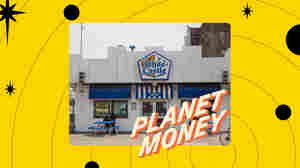Wanna go deeper? Subscribe to Planet Money+ and get sponsor-free episodes of Planet Money, The Indicator, and Planet Money Summer School. Plus access to bonus content. It's a new way to support the show you love. Learn more at plus.npr.org/planetmoney


Planet Money
From NPR
Wanna see a trick? Give us any topic and we can tie it back to the economy. At Planet Money, we explore the forces that shape our lives and bring you along for the ride. Don't just understand the economy – understand the world.
Wanna go deeper? Subscribe to Planet Money+ and get sponsor-free episodes of Planet Money, The Indicator, and Planet Money Summer School. Plus access to bonus content. It's a new way to support the show you love. Learn more at plus.npr.org/planetmoney
Most Recent Episodes
How useful, really, are the steps you can take after a data breach?
How useful, really, are the steps you can take after a data breach?
US Federal Reserve Board Chairman Jerome Powell arrives to testify during a House Committee on Financial Services hearing on "The Federal Reserve's Semi-Annual Monetary Policy Report," on Capitol Hill in Washington, DC, February 12, 2025. ALEX WROBLEWSKI/AFP via Getty Images hide caption
Career staff of the Office of Information and Regulatory Affairs work in the New Executive Office Building. Keith Romer/NPR hide caption
OIRA: The tiny office that's about to remake the federal government
OIRA: The tiny office that's about to remake the federal government
Alix Rodrigues, owner of Nut Hut in Vancouver, packing almonds. Amanda Aronczyk/NPR hide caption
WASHINGTON, DC - APRIL 02: Charts that show the "reciprocal tariffs" the U.S. is charging other countries are on display at the James Brady Press Briefing Room of the White House on April 2, 2025 in Washington, DC. Alex Wong/Getty Images hide caption
A bowl of blueberries which have been imported from Peru to the United States. Erika Beras/NPR hide caption
WASHINGTON, DC - MARCH 26: U.S. President Donald Trump displays a signed an executive order in the Oval Office of the White House on March 26, 2025 in Washington, DC. President Trump announced 25% tariffs on all foreign-made cars. Win McNamee/Getty Images hide caption









